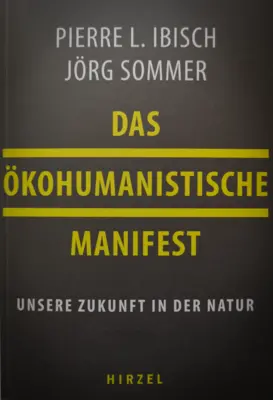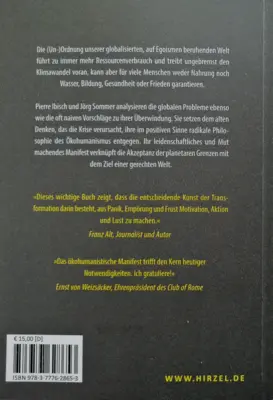New book on ecohumanism invites new perspectives
The book "The Ecohumanist Manifesto" will be published on 13 October 2021. It contains ten theses that take a critical look at current social changes. The authors argue in favour of a philosophy that focuses on the responsibility of humans as part of nature and not as its rulers. The book is the result of years of research and teaching at the Eberswalde University for Sustainable Development (HNEE).

Front book cover

Back book cover
"The global ecosystem is not a large supermarket where we stock up to satisfy our needs. A new philosophy is needed that focusses on the responsibility of humans as part of nature - and not as its rulers", is how Pierre Ibisch and Jörg Sommer explain the way of thinking of ecohumanism in their new book "The Ecohumanist Manifesto - Our Future in Nature".
Prof Ibisch, who has held a research professorship on the topic of "ecosystem-based sustainable development" at HNEE for several years, is one of the authors of the book. "The Ecohumanist Manifesto" follows on from the textbook published in 2018 "Humans in the Global Ecosystem - Introduction to Sustainable Development" which he initiated and coordinated. The textbook emerged from an interdisciplinary basic lecture on sustainable development at HNEE and is based on a novel, systemic approach to sustainability.:)
The present has no future
Based on an ecosystem-based view of people and the world, the authors take a critical look at current social challenges in their new book in the form of ten theses. Uncontrolled digitalisation and the current economic system play a central role here. They point out the dangers of an economy that is geared towards growth and not the common good and argue in favour of a new view of social and private property. Pierre Ibisch and Jörg Sommer invite their readers to adopt unconventional perspectives on faith, education systems and power structures. The authors demand: "Our thinking must be turned upside down, indeed, it must be grounded in the truest sense of the word. Grounded thinking is rooted in the ecosystem. It begins in nature and is orientated towards people. This gives rise to the new direction of thought: nature as the starting point, people as the goal.
The philosophy of ecohumanism
According to the authors in the book, ecohumanism places faith in people and their ability to act well at the centre. It combines the idea of the greatness of being human with due respect for human weaknesses and the actual role of us humans in nature. "This new, fundamentally different way of thinking is the philosophy that is needed to realign our human behaviour in the Anthropocene, the human-dominated geological era. In recent debates, the term "ecohumanism" has been coined to describe this.
Dedication and epilogue
The authors dedicate the book to the honorary senator of the university, Prof Dr Michael Succow, ecologist, responsible for the large protected areas in East Germany, the 'silverware of German unity', winner of the Alternative Nobel Prize.
Michael Succow: "The protection of nature for its own sake has long been at the centre of conservationists' work. Now we are realising with ever greater urgency that it is ultimately about us, about the continued existence of human civilisation! The new concept of ecohumanism comprehensively outlines the challenges of our time, in the realisation of planetary boundaries."
The Ecuadorian economist Alberto Acosta has contributed an afterword. Acosta was, among other things, Minister and President of the Constituent Assembly of Ecuador and is responsible for popularising the principle of the Good Life (buenvivir) worldwide.
Alberto Acosta in the epilogue: "The points of discussion raised in this book contribute to (...) taking steps towards a civilisational transformation that can no longer wait. We need societies in which the ideas of profit and property lose their meaning; societies whose ultimate goal is a fulfilling, dignified and just life."
"The Ecohumanist Manifesto - Our Future in Nature" contains drawings by Kat Rücker-Weininger, comprises 173 pages and will be published by Hirzel-Verlag on 13 October 2021.
Note on image material
The photos available here may be used for reporting purposes. Please note the copyright notice © HNEE